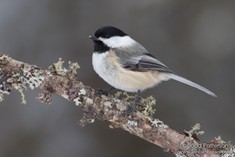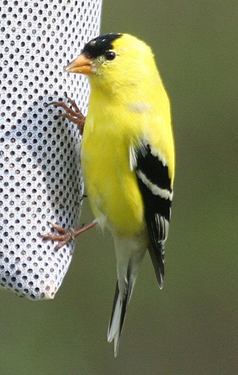Troubleshooting Issues at the Birdfeeder
Anyone who has fed the birds has experienced issues with their bird feeders ranging from no birds to sick birds and everything in between. While some of these issues can be simple to fix, others require a little effort and some thinking outside of the box. Let's go through the most common issues people have.
No birds at the feeder-This one is the most complicated of the issues because there are multiple reasons that birds might not be coming to your feeder. One of the most common reasons birds aren't visiting the bird feeder is the abundance of naturally occurring food. In late fall and early winter, birds have plenty of food available versus late winter when food is buried under snow or gone. In this instance, you just have to wait. Other reasons why birds might not be at the feeders are covered below.
reasons that birds might not be coming to your feeder. One of the most common reasons birds aren't visiting the bird feeder is the abundance of naturally occurring food. In late fall and early winter, birds have plenty of food available versus late winter when food is buried under snow or gone. In this instance, you just have to wait. Other reasons why birds might not be at the feeders are covered below.
Predators- Another reason birds might not be coming to your feeders is the presence of cats or birds of prey. The birds will avoid areas where predators are present but will return once they have moved on. Try to provide cover for birds to help them feel safe coming to your feeders. A simple way to provide this is using live Christmas trees tied around feeders to provide shelter. If the cat is yours, try to keep it indoors. It is estimated cats kill approximately 2.4 billion birds a year.
Not the birds you want- Cardinals, goldfinch, and chickadees are all popular birds everyone wants to see at their feeders, but what if you are only getting sparrows or starlings? The issue likely is you are feeding the wrong kind of food in the wrong feeder. To attract the widest variety of birds a mix of black oil sunflower seed and proso millet is the best option. With birdseed, you get what you pay for. If you can only feed one type of bird seed, stick with black oil sunflower.
Sick birds- Sanitationis vital when feeding the birds to prevent the spread of diseases among your visitors. Try to clean your feeders every couple of months, even in the winter. Empty all the bird seeds out of the feeders and wash well with soapy water. Follow up with a disinfectant solution of four ounces of chlorine bleach in one gallon of water. If you use wooden feeders, scrub the feeder with the bleach solution and then set the feeder in the sun to dry. The sun will help kill bacteria. If birds that appear ill start to come to your feeders take them down and wash them thoroughly. Leave the feeders down for several days before putting them back up.
Squirrels- While some people find squirrels funny and entertaining, they can become bullies at the bird feeder, driving birds away and stuffing themselves for hours. Anyone who has tried to keep squirrels away from the feeders, yes, even with the "squirrel-proof" ones, knows how ingenious they can be at overcoming all our ideas. One way to keep squirrels away from your feeders is to feed them elsewhere. Squirrels love corn, provide ears of corn elsewhere in your yard to keep them away from the feeders. Attach the corn cob to a post or a feeder otherwise, it will quickly wander off. Another option is to mix ground chili pepper with your bird seed to discourage squirrels. Birds lack the taste receptors to taste the chili powder so it doesn't bother them.
 Nuisance Animals-While squirrels can be a pain, they are not the only animals you might have issues with. Raccoons, opossums, skunks, and even deer can be a problem with your feeders. Ground chili pepper Raccoons are the most destructive of the critters that might visit your and the most resourceful. One option to prevent raccoons from knocking over the feeders is to bring them inside every night. Raccoons also do not like getting greasy so using lithium grease on the poles or posts should help deter them. Opossums are not as common at bird feeders as other animals but their habit of defecating in the feeders is a problem since the birds won't eat from the feeder till it's cleaned. Luckily they are easy to keep from most hanging feeders. Skunks are usually only attracted to the insects that feed on the seeds left on the ground. Cleaning the seed hulls up regularly should discourage them from visiting your feeders. Deer are typically not an issue but, they can knock over the feeders trying to eat bird seed.
Nuisance Animals-While squirrels can be a pain, they are not the only animals you might have issues with. Raccoons, opossums, skunks, and even deer can be a problem with your feeders. Ground chili pepper Raccoons are the most destructive of the critters that might visit your and the most resourceful. One option to prevent raccoons from knocking over the feeders is to bring them inside every night. Raccoons also do not like getting greasy so using lithium grease on the poles or posts should help deter them. Opossums are not as common at bird feeders as other animals but their habit of defecating in the feeders is a problem since the birds won't eat from the feeder till it's cleaned. Luckily they are easy to keep from most hanging feeders. Skunks are usually only attracted to the insects that feed on the seeds left on the ground. Cleaning the seed hulls up regularly should discourage them from visiting your feeders. Deer are typically not an issue but, they can knock over the feeders trying to eat bird seed.
Feeding the birds can be a wonderful experience, just remember that you put out a buffet and invited everyone in the neighborhood to come and visit. Don’t be surprised if a few critters you don’t want show up from time to time. Luckily most of those problems can be fixed with just a little bit of work.

Have questions? Contact our office where our Horticulture Extension Agent will assist you with questions.
Phone: (316) 321-9660
Email: callae@ksu.edu